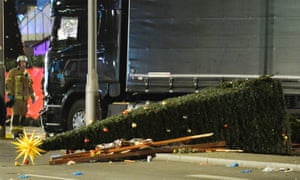
Deaths of at least 12 people at Berlin’s Breitscheidplatz exposes the stark reality that Christmas markets – so long the scenes of festive joy – are targets
By midnight, as streets all around the German capital were still echoing with the sound of sirens, an unreal calm had descended upon Breitscheidplatz square in the heart of Berlin’s central shopping district. Christmas lights were still sparkling, and groups of tourists ambled down the Kurfürstendamm boulevard, seemingly unaware as to why armed police officers were ushering them along.
The dark blue truck that had ploughed through the northern edge of the square’s busy Christmas market at around 8pm – killing at least 12 and injuring around 50– was resting lopsided on the pavement, with only its smashed window pane and a mangled Christmas tree beneath the vehicle’s wheels telling of the force of its deadly ride.
In the background, the Kaiser Wilhelm memorial church cast a mournful shadow over the scene. Singed and scarred by the bombs of the second world war, it had been left in ruins to remind future generations of the folly of warfare and fanaticism.
Berlin’s Christmas markets are popular because they are little utopias amid the end-of-year bustle, full of slow-roast meats, caramelised almonds and handmade wooden toys. Especially in the week before Christmas, many Berliners will have organised a visit to catch up with friends over cups of mulled wine.
Not just since the July attack in Nice, France, have politicians in Germany speculated that Christmas markets were an obvious target for anyone who wanted to expose western Europe’s sense of safety as an illusion. In 2000 police stopped four Algerian Islamists from setting off a bomb at a Christmas market in Strasbourg.
Berlin’s mayor, Michael Müller, who visited the scene shortly after 9pm, spoke for many in the city when he admitted concerns that his worst nightmare had turned into a reality: “We hope our fears that this is an attack won’t prove true.”
Some of Berlin’s Christmas markets, such as the one on Gendarmenmarkt, have in recent years set up security cordons. Others have banned rucksacks, encouraged stallholders to be more watchful and ordered plain-clothes police officers to mingle with the crowds.
But for the market on Breitscheidplatz – encircled by some of the city’s busier multi-lane arteries – that had never been an option. Instead, organisers had tried to make a virtue of the market’s “barrier free” nature, advertising it as the perfect place to drop into after a spot of Christmas shopping. A mini ferris wheel, two carousels and numerous stalls selling sweets were meant to entice children.
In the hours after the tragedy, police stated repeatedly that they did not yet know whether it had been a tragic accident or a sinister attack. A group of stallholders on the southern side of the market were convinced they had heard police say the truck’s driver had simply fallen asleep at the wheel. How could anyone want to deliberate crash a truck into such a scene of peace?
But as midnight drew near and more details emerged in the aftermath of the crash – with the person thought to be the driver arrested after reportedly fleeing the scene into nearby Tiergarten – it became harder and harder to avoid seeing a motive behind Monday night’s deadly rampage.
Germany’s interior minister, Thomas de Maizière, said: “I do not want to use the word the terrorism yet. But many things point in that direction.”
No comments:
Post a Comment